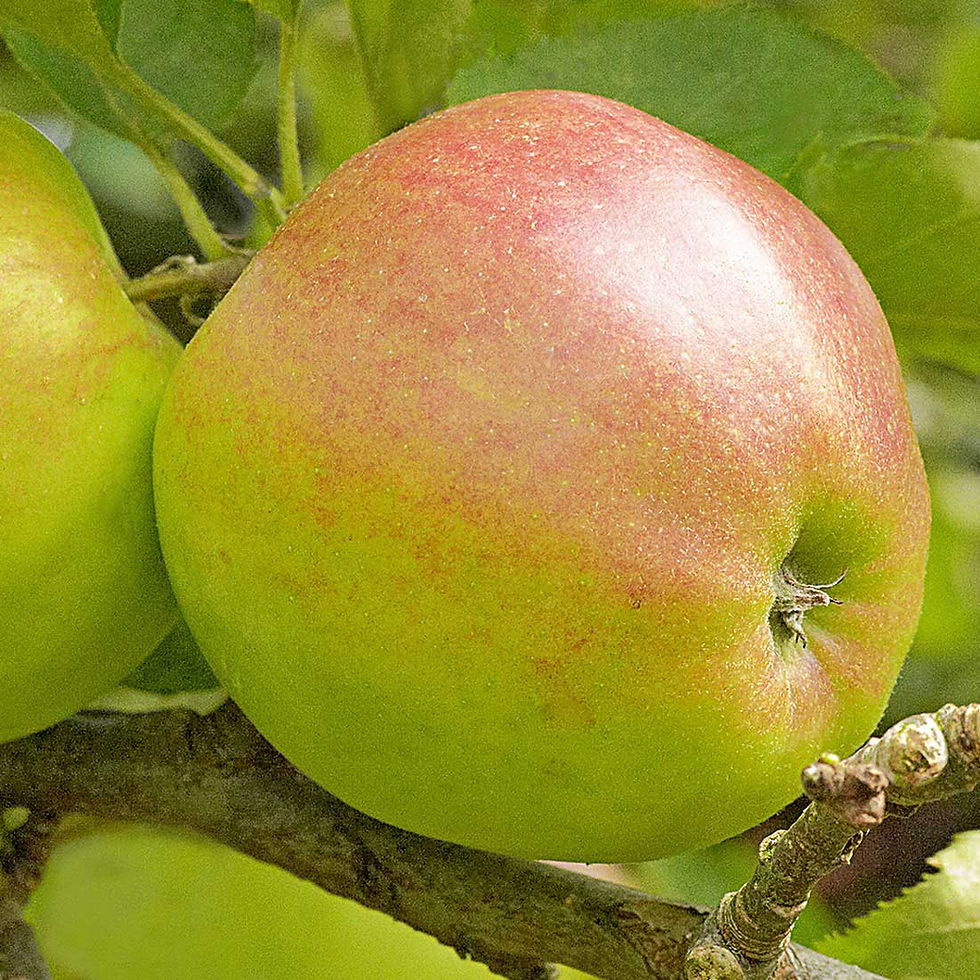Awesome facts about apples
- RespiteTeam
- Sep 13, 2022
- 4 min read

Apples, or wild Malus sieversii as they were first known, originated in the mountains of Kazakstan (Central Asia), and are members of Rosaceae (the rose family), such as pears, plums, peaches, cherries, strawberries, and raspberries. The fruit would have been smaller and more bitter than the today’s apples (Malus domestica).
The apple trees are one of the most widely cultivated of fruit trees, with China being the largest producer followed by United States of America. Together they produce more than fifty percent of the world's apple production.
Apple trees are deciduous (they shed their leaves in the autumn), and are small, reaching just 5-12 m tall. They normally flower in spring, producing white flowers, sometimes with a pink tinge. The fruit matures in mid-late autumn. The leaves are ovate, dark green, with an asymmetrical leaf base. The leaf margins are curved and serrated.
Vitamins and minerals
Apples are nutritious and a good source of vitamins and minerals:
Vitamin C - plays a vital role in the body, including the maintenance of bones and teeth. Vitamin C also boost your sleep, reduce sleep disturbances, relieve movement disorders, and decrease the dangerous effects of sleep apnoea. It also lowers the levels of stress hormone cortisol and your blood pressure.
Thiamine- also known as vitamin B1 - plays an important role in the metabolism of lipids, amino acids and glucose in the human body. Thiamine is an important dietary supplement occurring naturally in bitter leaves and helps to oxidize fatty acids in order to produce the synthesis of lipids, which is one of the body’s essential processes.
Riboflavin – also known as vitamin B2 - plays a crucial role in protecting the body from potentially harmful free radicals, which can do damage to everything from skin, to hair, energy levels and even disease resistance.
Pyridoxine – also known as vitamin B6 - has been associated with lowering the risk of heart disease, as well as reducing inflammation in people with rheumatoid arthritis. It also helps to regulate sleep and contributes to busting stress.
Folate - also known as vitamin B9 or folic acid. Folate is a natural form of vitamin B9 and is water soluble. It is found in many food plants. It is essential for DNA production, the development of red blood cells, and preventing anaemia. Folate is also important for preventing memory loss and boosting mood.
Vitamin K– plays a key role in helping the blood clot, preventing excessive bleeding.
Other plant compounds
Apples contain a range of antioxidants, including catechin, phloridzin, chlorogenic acid, quercetin and anthocyaninin.
Health benefits of apples
Apples provide an array of antioxidants that help neutralize free radicals. Free radicals are reactive molecules that can build up as a result of natural processes and environmental pressures. If too many free radicals accumulate in the body, they can cause oxidative stress, and this can lead to cell damage. This damage can contribute to a range of conditions, including cancer and diabetes.
The fibre found in apples may help manage blood pressure, which may reduce the risk of cardio-vascular disease.
Additional benefits
A 2004 study found that apples had many phytochemical benefits.
Neurological health and dementia - A 2019 laboratory study concluded that quercetin has a neuroprotective effect.
Lower risk of stroke – A 2011 article entitled ‘An apple a day keeps stroke away’ and published in Stroke found that people who ate the most apples had a lower thrombotic stroke.
Cholesterol - One 2019 study found that eating raw apples lowered levels of low-density lipoprotein cholesterol among healthy people, but that drinking clear apple juice did not have the same impact. The authors therefore conclude that it is the fibre in apples that helps reduce cholesterol.
Diabetes –A 2019 study found that three randomised controlled trials, with a total of 236 participants, reported the effect of apple intake on insulin levels and found no difference in insulin levels between groups. However, not all apples have the same sugar level as pointed out by a 2003 study.
Cancer - Consuming antioxidant-rich foods may help prevent the oxidative stress that causes cell damage and may lead to the development of certain cancers. Apples are a good source of antioxidants and may help prevent cancer.
Obesity -Apples are packed with healthy flavonoids and fibres that may help reduce weight. They are particularly rich in pectin fibre that breaks down slowly.
Trivia
The well-known aphorism Eating an apple a day keeps the doctor away is said to originate from Wales and was first published in the 1866 February edition of Notes and Queries – a magazine that cited: ‘A Pembrokeshire proverb, Eat an apple on going to bed, and you'll keep the doctor from earning his bread.’
A 2015 study which looked at the association between apple consumption and physician visits concluded that apples may at least keep the pharmacist away.
Disclaimer
If you or any other person has any medical concern, consult with a healthcare professional. Never disregard professional medical advice or delay in seeking it because of something that you have read on this blog or in any linked materials. This article is for informational purposes only. It is not intended to replace medical advice, diagnosis or treatment. Every person is different and may react to different herbs and teas differently. Never use teas or herbs to treat serious medical conditions on your own. Always seek professional medical advice before choosing home remedies.

Comentarios